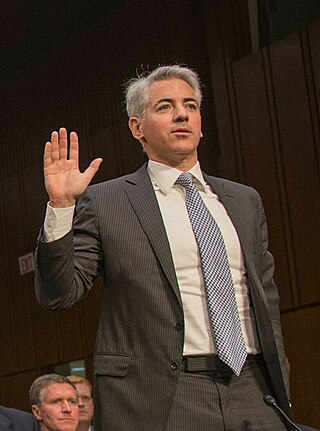A shareholder rights plan, colloquially known as a "poison pill", is a type of defensive tactic used by a corporation's board of directors against a takeover.
In business, a takeover is the purchase of one company by another. In the UK, the term refers to the acquisition of a public company whose shares are listed on a stock exchange, in contrast to the acquisition of a private company.
In business, a corporate raid is the process of buying a large stake in a corporation and then using shareholder voting rights to require the company to undertake novel measures designed to increase the share value, generally in opposition to the desires and practices of the corporation's current management. The measures might include replacing top executives, downsizing operations, or liquidating the company.

A joint-stock company (JSC) is a business entity in which shares of the company's stock can be bought and sold by shareholders. Each shareholder owns company stock in proportion, evidenced by their shares. Shareholders are able to transfer their shares to others without any effects to the continued existence of the company.
Shareholder activism is a form of activism in which shareholders use equity stakes in a corporation to put pressure on its management. A fairly small stake may be enough to launch a successful campaign. In comparison, a full takeover bid is a much more costly and difficult undertaking. The goals of shareholder activism range from financial to non-financial. Shareholder activists can address self-dealing by corporate insiders, although large stockholders can also engage in self-dealing to themselves at the expense of smaller minority shareholders.
Demutualization is the process by which a customer-owned mutual organization (mutual) or co-operative changes legal form to a joint stock company. It is sometimes called stocking or privatization. As part of the demutualization process, members of a mutual usually receive a "windfall" payout, in the form of shares in the successor company, a cash payment, or a mixture of both. Mutualization or mutualisation is the opposite process, wherein a shareholder-owned company is converted into a mutual organization, typically through takeover by an existing mutual organization. Furthermore, re-mutualization depicts the process of aligning or refreshing the interest and objectives of the members of the mutual society.
Non-voting stock is the stock that provides the shareholder very little or no vote on corporate matters, such as election of the board of directors or mergers. This type of share is usually implemented for individuals who want to invest in the company's profitability and success at the expense of voting rights in the direction of the company. Preferred stock typically has non-voting qualities.
The term standstill agreement refers to various forms of agreement which may be entered into in order to delay action which might otherwise take place.

Other People's Money is a 1991 American romantic comedy-drama film directed by Norman Jewison, starring Danny DeVito, Gregory Peck and Penelope Ann Miller. It was adapted by screenwriter Alvin Sargent from the 1989 play of the same name by Jerry Sterner.
A special purpose acquisition company, also known as a "blank check company", is a shell corporation listed on a stock exchange with the purpose of acquiring a private company, thus making the private company public without going through the initial public offering process, which often carries significant procedural and regulatory burdens. According to the U.S. Securities and Exchange Commission (SEC), SPACs are created specifically to pool funds to finance a future merger or acquisition opportunity within a set timeframe; these opportunities usually have yet to be identified while raising funds.
Share repurchase, also known as share buyback or stock buyback, is the reacquisition by a company of its own shares. It represents an alternate and more flexible way of returning money to shareholders. When used in coordination with increased corporate leverage, buybacks can increase share prices.

Unocal v. Mesa Petroleum Co., 493 A.2d 946 is a landmark decision of the Delaware Supreme Court on corporate defensive tactics against take-over bids.

William Albert Ackman is an American billionaire hedge fund manager who is the founder and chief executive officer of Pershing Square Capital Management, a hedge fund management company. His investment approach has made him an activist investor. As of January 2024, Ackman's net worth was estimated at $4 billion by Forbes.

The United Kingdom company law regulates corporations formed under the Companies Act 2006. Also governed by the Insolvency Act 1986, the UK Corporate Governance Code, European Union Directives and court cases, the company is the primary legal vehicle to organise and run business. Tracing their modern history to the late Industrial Revolution, public companies now employ more people and generate more of wealth in the United Kingdom economy than any other form of organisation. The United Kingdom was the first country to draft modern corporation statutes, where through a simple registration procedure any investors could incorporate, limit liability to their commercial creditors in the event of business insolvency, and where management was delegated to a centralised board of directors. An influential model within Europe, the Commonwealth and as an international standard setter, UK law has always given people broad freedom to design the internal company rules, so long as the mandatory minimum rights of investors under its legislation are complied with.
The Bull-dog Sauce Case is a Supreme Court of Japan case that resulted in a landmark decision regarding hostile takeover defense plans. The Court held that such plans do not necessarily violate the principle of shareholder equality under Japanese statutes, even if they result in discriminatory treatment some shareholders; however, such decisions must be made by shareholders themselves, acting in the company's best interest; they cannot be made by management to protect itself. The Bull-dog Sauce case arose from the first use of a poison pill by a Japanese company, and resulted in the Supreme Court's first ruling on the subject of takeover defenses.

Private equity in the 1980s relates to one of the major periods in the history of private equity and venture capital. Within the broader private equity industry, two distinct sub-industries, leveraged buyouts and venture capital experienced growth along parallel although interrelated tracks.
In mergers and acquisitions, a mandatory offer, also called a mandatory bid in some jurisdictions, is an offer made by one company to purchase some or all outstanding shares of another company, as required by securities laws and regulations or stock exchange rules governing corporate takeovers. Most countries, with the notable exception of the United States, have provisions requiring mandatory offers.
The following is a glossary which defines terms used in mergers, acquisitions, and takeovers of companies, whether private or public.

Pershing Square Capital Management is an American hedge fund management company founded and run by Bill Ackman, headquartered in New York City.

Paul Alec Bilzerian is an American businessman and corporate takeover specialist.







